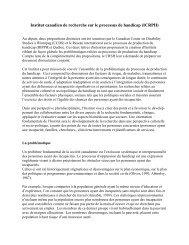Full Report - Fondation canadienne pour l'amélioration des services ...
Full Report - Fondation canadienne pour l'amélioration des services ...
Full Report - Fondation canadienne pour l'amélioration des services ...
You also want an ePaper? Increase the reach of your titles
YUMPU automatically turns print PDFs into web optimized ePapers that Google loves.
to an absence of an efficient communication network. This fundamental shift in health care<br />
delivery hinges upon notifying and informing the primary care network about the in-hospital<br />
component of their patients’ care.<br />
Another key element driving the importance of this project is the current revolution we are<br />
experiencing in information technologies, both in the home and in the health care milieu. In the<br />
latter setting, computers have transformed the areas related to research and education for health<br />
care professionals but have been slower to benefit patients in a more direct manner. This study is<br />
of compelling interest to managers because it showcases an intervention that takes advantage of<br />
the explosion in computer-related technologies and uses it to facilitate the continuity of care that<br />
patients receive within hospitals and the PCN (i.e., family physicians, CLSCs).<br />
The intervention developed for this study was <strong>des</strong>igned to enhance communication and<br />
integration within the health care system. The research focus was also to examine the potential<br />
impact on resource utilization, health care provider satisfaction and patient satisfaction. These<br />
effects, derived from enhanced information transfer between these two settings will compel<br />
policy managers to consider reliable mo<strong>des</strong> of communication as a fundamental component of<br />
health service policy and infrastructure.<br />
Implications<br />
Decision makers in health policy<br />
The SCS project lends support to several of the major recommendations contained within the<br />
report issued by the Commission on the Future of Health Care in Canada led by former<br />
Saskatchewan Premier Roy Romanow. Through major recommendations 8 through to 11, the<br />
report focuses on the importance of continued investment and development of Canada’s health<br />
information technology infrastructure. The Romanow report is largely focused upon the<br />
electronic patient file that would provide health care practitioners with authorized access to<br />
diagnoses, treatments and results. The implications of the SCS project extend beyond this<br />
recommendation and emphasize instead the importance of timely information transfer between<br />
acute care and primary care <strong>services</strong> in the context of acute illness. Specifically, the SCS project<br />
4














